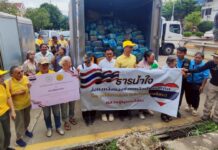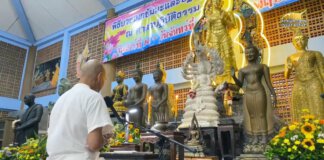พระโพธิสัตว์เกิดเป็นโค
๒๔ กุมภาพันธ์ ๒๕๖๘
นันทิวิสาลชาดก
พระศาสดา เมื่อประทับอยู่ในพระวิหารเชตวัน ทรงปรารภการพูดเสียดแทงให้เจ็บใจของพวกภิกษุฉัพพัคคีย์ จึงตรัสพระธรรมเทศนานี้ มีคำเริ่มต้นว่า มนุญฺญเมว ภาเสยฺย ดังนี้.
สมัยนั้น พวกภิกษุฉัพพัคคีย์ เมื่อกระทำการทะเลาะ ข่มขู่ ขับไล่ตะเพิด ทิ่มแทงด้วยวาจาส่อเสียด ด่าด้วย เรื่องสำหรับด่า ๑๐ ประการ.
***********************
โอมสวาท คำพูดเสียดแทงให้เจ็บใจ หรือให้ได้ความอัปยศ ได้แก่ การพูดแดก หรือประชดก็ตาม ด่าก็ตาม กระทบถึงอักโกสวัตถุ ๑๐ ประการ มีชาติกำเนิด ชื่อ ตระกูล เป็นต้น
ภิกษุกล่าวโอมสวาทแก่ภิกษุต้องอาบัติปาจิตตีย์ แก่อนุปสัมบันต้องอาบัติทุกกฏ ตามสิกขาบทที่ ๒ แห่งมุสาวาทวรรค ปาจิตติยกัณฑ์
อักโกสวัตถุ เหตุที่หยิบยกขึ้นมาด่า มี ๑๐ อย่าง คือ
๑. ชาติ ได้แก่ ชั้นหรือกำเนิดของคน
๒. ชื่อ
๓. โคตร คือตระกูลหรือแซ่
๔. การงาน
๕. ศิลปะ
๖. โรค
๗. รูปพรรณสัณฐาน
๘. กิเลส
๙. อาบัติ
๑๐. คำสบประมาทอย่างอื่นๆ
***********************
ภิกษุทั้งหลายจึงกราบทูลแด่พระผู้มีพระภาคเจ้า
พระผู้มีพระภาคเจ้ารับสั่งให้เรียกภิกษุฉัพพัคคีย์มา แล้วตรัสถามว่า ดูก่อนภิกษุทั้งหลาย ได้ยินว่า พวกเธอกระทำการทะเลาะ จริงหรือ? เมื่อพวกภิกษุฉัพพัคคีย์กราบทูลว่า จริง พระเจ้าข้า.
จึงทรงติเตียน แล้วตรัสว่า ดูก่อนภิกษุทั้งหลาย ชื่อว่าวาจาหยาบคายมีกระทำแต่ความฉิบหายให้ ไม่เป็นที่พอใจแม้แห่งสัตว์เดียรัจฉาน แม้ในกาลก่อน สัตว์เดียรัจฉานตัวหนึ่ง ย่อมยังคนผู้ร้องเรียกตนด้วยคำหยาบ ให้พ่ายแพ้จนต้องเสียทรัพย์พันหนึ่ง แล้วจึงทรงนำอดีตนิทานมา ดังต่อไปนี้.
ในอดีตกาล มีพระราชาพระนามว่า คันธาระ ครองราชสมบัติอยู่ในเมืองตักกสิลา แคว้นคันธาระ พระโพธิสัตว์บังเกิดในกำเนิดโค. ครั้งในกาลที่พระโพธิสัตว์เป็นลูกโคหนุ่มนั่นเอง.
พราหมณ์คนหนึ่งได้รับโคนันทิวิสาลพระโพธิสัตว์นั้นจากสำนักของทายก ตั้งชื่อว่า นันทิวิสาล แล้วเลี้ยงดูดุจดังบุตรอันเป็นที่รัก ให้ข้าวยาคูและภัตเป็นต้น บำรุงเลี้ยงดูแลอาบน้ำ มีที่หลับที่นอนดุจดังบุตรในอุทร
พระโพธิสัตว์เจริญวัยแล้ว คิดว่า พราหมณ์ผู้นี้ปรนนิบัติเลี้ยงดูเรามาอย่างยากลำบาก ชื่อว่า โคอื่น ผู้มีธุระเสมอเช่นกับเรา ย่อมไม่มี ในชมพูทวีปทั้งสิ้น. ถ้ากระไร เราพึงแสดงกำลังของตน เพื่อเป็นค่าเลี้ยงดูแก่พราหมณ์.
วันหนึ่ง โคนันทิวิสาลพระโพธิสัตว์กล่าวกะพราหมณ์ว่า พราหมณ์ท่านจงไป จงเข้าไปหาโควินทกเศรษฐีนั่น แล้วกล่าวว่า โคพลิพัทของเรายังเกวียนร้อยเล่มซึ่งผูกติดๆ กันให้เคลื่อนไปได้ ท่านจงกระทำการเดิมพันด้วยทรัพย์พันกหาปณะ พราหมณ์นั้นจึงไปยังสำนักของเศรษฐี สั่งสนทนาขึ้นว่า ในนครนี้ โคของใครเพียบพร้อมด้วยเรี่ยวแรงมากกว่ากัน
ลำดับนั้น เศรษฐีจึงกล่าวกะพราหมณ์นั้นว่า โคของผู้คนทั้งสิ้นในพระนครทั่วทั้งนคร ก็หาได้สู้กำลังอันแข็งแรงเท่าโคของเรา ย่อมไม่มี.
พราหมณ์กล่าวว่า ข้าแด่ท่านเศรษฐี โคของเรามีอยู่ตัวหนึ่งอาจสามารถทำให้เกวียนร้อยเล่มที่ผูกติดๆ กันเคลื่อนไปได้
เศรษฐีพอได้ฟังดังนั้นจึงกล่าวว่า พราหมณ์ โคเห็นปานนี้ จะมีมาแต่ไหน.
พราหมณ์จึงกล่าวว่า มีอยู่ในเรือนของเรา
เศรษฐีจึงกล่าวว่า ถ้าอย่างนั้น ท่านกล้าที่จะกระทำเดิมพันกับเราหรือไม่
พราหมณ์กล่าวว่า ดีละ ข้าพเจ้าจะพนันกับท่าน แล้วได้กระทำเดิมพันด้วยทรัพย์พันกหาปณะ
วันต่อมา พราหมณ์นั้นนำเกวียนร้อยเล่มอันเต็มด้วยทราย กรวด และหินเป็นต้น แล้วจอดเรียงไว้ตามลำดับ แล้วผูกเกวียนทุกเล่มเข้าด้วยกัน ด้วยเชือกสำหรับผูกเพลา เวลาต่อมาพราหมณ์นั้นจึงให้โคนันทิวิสาลอาบนํ้า พร้อมเจิมด้วยของหอม ประดับพวงมาลาที่คอ พร้อมจูงโคนันทิวิสาลไปผูกเทียมกับเกวียนเล่มแรก ตนเองนั่งที่คันเกวียน เงื้อปฏักขึ้น แล้วกล่าวว่า เจ้าโคโกง จงลากไป เจ้าโคโกง จงนำไป.
พระโพธิสัตว์คิดว่า แต่เดิมมาพราหมณ์ผู้นี้เคยร้องเรียกเราว่าผู้ไม่ดื้อ แต่วันนี้กับมาร้องเรียกเราว่า วัวดื้อ จึงยืนทำเท้าทั้ง ๔ ให้นิ่ง เหมือนเสา ที่ปักลงไปในแผ่นดิน
เมื่อวัวนันทิวิสาลไม่สามารถพาให้เกวียนร้อยเล่มเคลื่อนที่ไปได้ จึงถือว่าพราหรมณ์ผู้นั้นแพ้พนัน
ในเวลาต่อมา เศรษฐีจึงให้พราหมณ์นำทรัพย์พันกหาปณะมาจ่ายให้
พราหมณ์แพ้ (พนัน) ด้วยทรัพย์พันกหาปณะ จึงปลดโคออกจากเครื่องพันธนาการแล้วกลับไปยังเรือนของตนด้วยความหมดอาลัย ถูกความโศกครอบงำ จึงได้แต่นอนเอามือก่ายหน้าผากถอดถอนใจ.
โคนันทิวิสาลเมื่อดูพราหมณ์ปลดเครื่องพันธนาการออกก็เดินเที่ยวไปและเล็มหญ้าจึงกลับมา เห็นพราหมณ์ถูกความโศกครอบงำ จึงเข้าไปหา แล้วกล่าวว่า พราหมณ์ ท่านนอนไม่หลับหรือ.
พราหมณ์กล่าวว่า เราแพ้พนันด้วยทรัพย์พันกหาปณะ จะเอาอารมณ์หลับมาแต่ไหน.
โคนันทิวิสาลกล่าวว่า ท่านพราหมณ์ ฉันอยู่ในเรือนของท่านมาตลอดกาล มีประมาณเท่านี้ เคยทำภาชนะอะไรๆ แตก เคยเหยียบใครๆ หรือเคยถ่ายอุจจาระ ปัสสาวะ ในที่อันไม่ควร มีอยู่หรือ.
พราหมณ์กล่าวว่า ไม่มีดอกพ่อ.
ลำดับนั้น โคนันทิวิสาลกล่าวว่า เมื่อเป็นเช่นนั้น เพราะเหตุไร ท่านจึงเรียกฉัน ด้วยวาทะว่าโคดื้อเล่า นั้นเป็นโทษของท่านเท่านั้น โทษของฉันไม่มี ท่านจงไป จงทำเดิมพันด้วยทรัพย์ ๒,๐๐๐ กหาปณะกับเศรษฐีนั้นใหม่อีกครั้ง แต่ขออย่างเดียว ท่านอย่าเรียกฉันผู้ไม่ดื้อ ด้วยวาทะว่าโคดื้อ.
พราหมณ์ได้ฟังคำของโคนันทิวิสาลนั้นแล้ว ไปกระทำเดิมพันด้วยทรัพย์ ๒,๐๐๐ กหาปณะ แล้วผูกเกวียนร้อยเล่มติดกัน โดยเกวียนทุกเล่มล้วนมีอิฐ หิน ทราย ดิน และโลหะ บรรทุกอยู่เต็มทุกลำเกวียน พร้อมทั้งประดับโคนันทิวิสาล แล้วเทียมเกวียนเล่มแรกเข้าที่ทูบเกวียน.
ถามว่า เทียมอย่างไร?
ตอบว่า พราหมณ์ผูกแอกให้แน่นที่ทูบเกวียน แล้วเทียมโคนันทิวิสาลเข้าที่ปลายแอกข้างหนึ่ง แล้วเอาเชือกที่ทูบเกวียน พันปลายแอกข้างหนึ่ง แล้วใส่ไม้คํ้ายันปลายแอก เพลาและเชิงเกวียน เอาเชือกนั้นผูกให้แน่นแล้วจอดไว้ ก็เมื่อกระทำอย่างนี้ แอกย่อมไม่เคลื่อนไปทางโน้นทางนี้ โคตัวเดียวเท่านั้น อาจลากไปได้.
ลำดับนั้น พราหมณ์นั่งบนทูบเกวียน ลูบหลังโคนันทิวิสาลนั้น พลางกล่าวว่า พ่อโคผู้เจริญ พ่อจงไป โคผู้เจริญ พ่อจงลากไป. พระโพธิสัตว์ลากเกวียนร้อยเล่มที่ผูกติดกัน ด้วยกำลังแรงครั้งเดียวเท่านั้น ให้เกวียนเล่มที่ตั้งอยู่ข้างหลังไปตั้งอยู่ในที่ของเกวียนซึ่งตั้งอยู่ข้างหน้า โควินทกเศรษฐีเห็นถึงพละกำลังของโคนันทิวิสาลเช่นนั้น จึงได้ยอมรับว่าตนแพ้จึงได้ให้ทรัพย์ ๒,๐๐๐ กหาปณะแก่พราหมณ์ มนุษย์แม้อื่นๆ ก็ได้ให้ทรัพย์เป็นอันมากแก่พระโพธิสัตว์ ทรัพย์ทั้งหมดนั้นได้เป็นของพราหมณ์ทั้งนั้น พราหมณ์นั้นอาศัยพระโพธิสัตว์ จึงได้ทรัพย์เป็นอันมาก ด้วยประการอย่างนี้.
พระศาสดาตรัสว่า ดูก่อนภิกษุทั้งหลาย ชื่อว่าคำหยาบไม่เป็นที่ชอบใจของใครๆ แล้วทรงติเตียนพวกภิกษุฉัพพัคคีย์ แล้วทรงบัญญัติสิกขาบท เป็นพระผู้ตรัสรู้พร้อมเฉพาะแล้ว จึงตรัสพระคาถานี้ว่า
บุคคลพึงกล่าวแต่คำที่น่าพอใจเท่านั้น ไม่พึงกล่าวคำที่ไม่น่าพอใจ ในกาลไหนๆ เมื่อพราหมณ์กล่าวคำที่น่าพอใจ โคนันทิวิสาลได้ลากเอาภาระหนักไปได้ ทำพราหมณ์ผู้นั้นให้ได้ทรัพย์ด้วย ตนเองก็เป็นผู้ปลื้มใจเพราะการช่วยเหลือนั้นด้วย.
พระศาสดา ครั้นทรงนำพระธรรมเทศนานี้ว่า มนุญฺญเมว ภาเสยฺย มาด้วยประการฉะนี้แล้ว จึงทรงประชุมชาดกว่า
พราหมณ์ในกาลนั้น ได้เป็น พระอานนท์
ส่วนโคนันทิวิสาลได้เป็น เราคือพระสัมมาสัมพุทธเจ้า แล.
พุทธะอิสระ
——————————————–
อ่านย้อนหลัง : https://www.facebook.com/buddha.isara/posts/pfbid0NHbJbfE6wrsavGLYrPD3TfpR9WYNgsfUzxcpg253ePyycSuRtCM3Ti4FvMFLEg8al
——————————————–
The Bodhisatta was born as a bull.
February 24, 2025
Nandivisala Jataka
While residing at the Jetavana Monastery, the Buddha spoke about the group of six Chabbaggiya monks’ harsh speech (The six Chabbaggiya monks were notorious monks referred to as the first offenders of various Vinaya offenses), beginning with the words “manuññameva bhaseyya”.
When these Chabbaggiya monks quarreled, threatened, expelled, and hurt others with slanderous words, and cursed others by the following ten topics for abuse.
***********************
Oma Swata, words that hurt or bring shame, such as speaking sarcastically or swearing with the 10 Akkosa Vatthu (ten bases for abuse) such as birth, name, family, etc.
A monk who says Om Swata to a monk is guilty of a Pacittiya offense, or to an Anupasampanna (anyone who has not yet received the full ordination) is guilty of a Dukkata offense, according to the second rule of the Musādavagga. Pacittiyakantha.
Akkosa Vatthu or ten topics for abuse:
1. Birth, namely the class or birth of a person
2. Name
3. Lineage, namely the clan or family
4. Work
5. Craft
6. Disease
7. Physical appearance
8. Defilements
9. Offence
10. Other insults
***********************
The monks then reported to the Buddha.
The Buddha called the six monks over and asked, “Monks, is it true that you are quarreling?” The six monks admitted.
The Buddha rebuked them, “Monks, harsh speech only brings disaster and is not pleasing even to animals. Even in the past, an animal made a person who had spoken harsh words to it lose a thousand coins. Then, the Buddha related the story of the past as follows:
In the past, King Gandhara ruled the Takkasila City in the Gandhara region. The Bodhisatta was born as a bull. A Brahmin received the young calf Bodhisatta from a donor and named it Nandivisala. The Brahmin treated it like his own child. He fed it with rice, porridge, food, etc. He took care of it, bathed it, and gave it a sleeping place as if the bull were his son.
When the bull Bodhisatta grew up, it thought: This Brahmin has taken care of me with great pain. In the whole Indian continent, no other calf has received the best care as me. How if I were to repay the brahmin the cost of my nurture by making proof of my strength? One day, the Nandivisala bull Bodhisatta told the Brahmin: Brahmin, go to the wealthy merchant Kovindaka and tell him: My bull can move a hundred loaded carts together. You should make a wager of a thousand kahāpaṇas (ancient currency unit). The Brahmin then went to the wealthy merchant’s house and discussed whose bulls in this city were more powerful.
Then the wealthy merchant told the Brahmin: None of the bulls in the city are as strong as ours.
The Brahmin said: My lord, I have a bull that can pull a hundred loaded carts.
Hearing this, the wealthy merchant asked: Brahmin, where can I find such a bull?
The Brahmin said: It is in our house.
The wealthy merchant said: Then, do you dare to make a wager with me?
The Brahmin said: Good, I will make a wager with you. And he made a wager of a thousand kahāpaṇas.
The next day, the Brahmin loaded a hundred carts with sand, gravel, and stones, and leashed the lot together, one behind the other, by cords from the axle tree of the one in front to the trace bar of its successor. Later, the Brahmin bathed Nandi Visala, anointed it with perfume, hung a garland around its neck, and harnessed it all. The Brahmin sat on the cart, raised his scepter, and said, “You rogue bull, pull it, you rogue bull, take it.”
The Bodhisatta thought, “In the past, this Brahmin used to call me the obedient one, but now he calls me the rogue bull.” So, it stood with all its feet still, like a post planted in the ground.
When the Nandivisala bull could not move the hundred carts, the Brahmin lost the bet. The rich merchant ordered the Brahmin to pay him a thousand kahāpaṇas.
The Brahmin lost the bet with a thousand kahāpaṇas. His money was gone. The Brahmin took his bull out of the cart and went home. Then, he lay down on his bed in agony, covering his forehead, and sighing. When Nandivisala was untied, it strolled around, ate grass, and returned home.
Seeing the Brahmin overcome by grief, it approached him and asked, “Brahmin, can you not sleep?” The Brahmin said, “I lost a bet of a thousand kahāpaṇas. How could I sleep?”
Nandivisala said, “Brahmin, all the time I have lived in your house, have I ever broken a pot, stepped on anyone, or defecated or urinated in an inappropriate place?
The Brahmin said, “Never, my friend.” Then, Nandivisala said, “Then, why did you call me rogue?” That was your fault, not mine. Go and make another bet of two thousand kahāpaṇas with that rich man. But I ask one thing: do not call me rogue again.” When he heard this, the Brahmin went off to the merchant and laid a wager of two thousand. Like before, he leashed the hundred carts to one another and harnessed Nandivisala, very spruce and fine, to the leading cart.
Question : How was it yoked?
Answer : The Brahmin tied the yoke tightly to the cart trail, then tied the Nandivisala bull to one end of the yoke, then wrapped the rope from the cart trail around one end of the yoke, then put a support rod to the end of the yoke, the axle and the foot of the cart, tied the rope tightly and stopped it. When he did this, the yoke would not move this way or that, and a single bull could pull it.
Then, the Brahmin sat on the cart trail, stroked the back of the Nandivisala bull, and said: “Now then, my fine fellow, pull them along, my fine fellow!”. The Bodhisatta pulled a hundred carts tied together with one force, and the carts at the back were placed in the place of the carts at the front.
The wealthy merchant Kovindaka, seeing the strength of the bull Nandivisala, admitted that he had lost and gave two thousand kahāpaṇas to the Brahmin. Other people also gave a lot of wealth to the Bodhisatta. All of that wealth belonged to the Brahmin. Relying on the Bodhisatta, the Brahmin gained a lot of wealth.
The Buddha said, “Monks, coarse words are not pleasing to anyone.” Then, he criticized the six Chabbaggiya monks and established the rules of conduct. The Buddha uttered this verse:
Speak only kind words, not unpleasant words.
When the Brahmin spoke pleasing words, the bull Nandavisala dragged away the heavy burden and made the Brahmin gain wealth. The Brahmin himself was also delighted by that help.
The Buddha, having delivered this sermon, said, Manuññameva bhaseyya, then he concluded the story:
The Brahmin at that time became Ananda.
And the bull Nandivisala became me, the Buddha.
Buddha Isara
——————————————–
Previous article : https://www.facebook.com/buddha.isara/posts/pfbid0NHbJbfE6wrsavGLYrPD3TfpR9WYNgsfUzxcpg253ePyycSuRtCM3Ti4FvMFLEg8al






